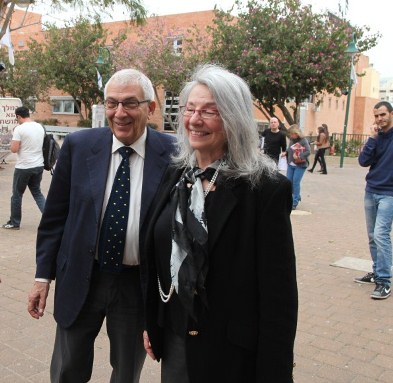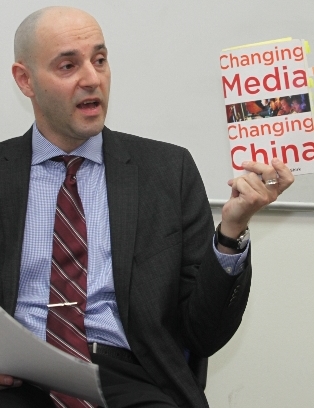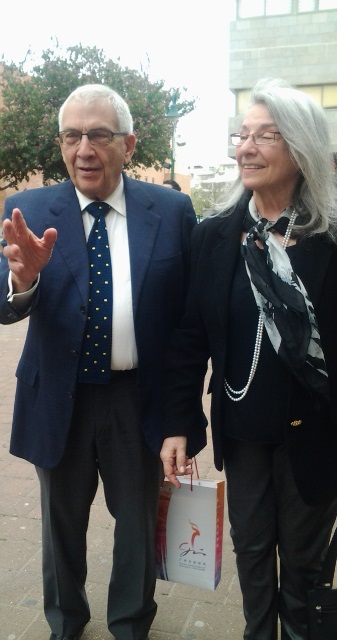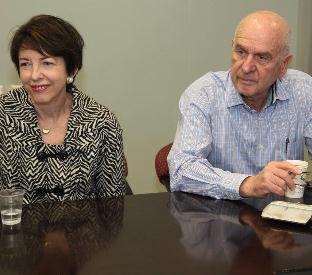
Community

First Chinese Media Centre opens in Israel
Published
10 years agoon
By
adminANT KATZ
All photos courtesy COMAS
Reflecting the fast-growing ties between Israel and the world’s most populous country, the first fully-fledged Media Centre for the study of Chinese in the Middle East has been opened. Where? In Israel, of course.
Not only this, but of interest to SA Jewry and expats, two well-known South African Olim have been very involved in getting the project off the ground.
“In fact, it was Dr Anne Swersky and her husband Barry, a business leader with many ties to China, who were the main drivers of having the Centre housed at the College of Management—Academic Studies in Rishon LeZion, Israel,” says the centre’s Laura Kam.
The Centre was launched on 17 March at the College of Management-Academic Studies (COMAS) in Rishon LeZion – and is the only Israel-focused academic program or NGO worldwide which will engage Chinese media and opinion leaders on a regular and sustained basis in Mandarin Chinese.
One quarter of the world’s newspapers are in Chinese and hundreds of millions of Chinese get their news on social media.

RIGHT: Barry Swersky and his wife Dr Anne Kirson Swersky at the The Centre, housed at the The School of Media Studies – Israel’s largest communications school
The Chinese Media Centre at the College of Management – Academic Studies is the first of its kind in the Middle East, joining only three such centres in the world’s leading academic institutions. The others are in in Hong Kong (University of Hong Kong), London (University of Westminster) and Los Angeles (University of Southern California). It is the only Israel-focused academic program or NGO program that will engage Chinese media and opinion leaders in Chinese on a regular and sustained basis.
“The Chinese Media Centre will maintain a proactive dialogue with the Chinese media and conduct cutting-edge research of the media systems in the Greater China area,” says Bam.
The Centre will also be in a regular contact with the Chinese print, digital, and broadcast media, facilitating greater understanding of Israel in China and be an educational tool for COMAS students. Leveraging the college’s state-of-the-art facilities and media and communications research centers, the Chinese Media Centre will connect Israel and China in a systematic dialogue with scholarly and professional exchanges
Chinese Media “highly interested” in Israel
The Centre aims to serve Israel’s long-term interest by pursuing independent scholarship and help Israel adopt a proactive attitude when dealing with China.

LEFT: Chinese Media Centre Director, Alexander Pevzner, discussing book “Changing Media Changing China”
According to Alex Pevzner, the Centre’s founding director, “Chinese media is highly interested in Israel, particularly in non-political content. Stories about Israel, which focus on Israel’s strengths in fields of high importance to the Chinese, such as food security and agri-tech, high-tech, med-tech and clean energy, can help cement both economic and political ties between the two nations.
In addition, says Pevzner, “For Israel it is imperative to understand the Chinese media, as it serves as a window on China and China’s voice to the world.”
China has the world’s largest media system in terms of sheer numbers and language reach – Mandarin Chinese being the world’s most spoken language, used by 1.4 billion people in China, Hong Kong, Taiwan, Macau, and the Chinese diaspora. The growth of the Chinese media and its global reach is the result of China’s more than three decades of economic reforms and increasing global profile, making it a crucial component in understanding the way China is changing and the implications of these changes.

RIGHT: Barry Swersky and his wife Dr Anne Kirson Swersky at the 17 March opening of “The Chinese Media Centre”
One of the Centre’s goals is to promote student and journalist exchange programs, from Israel to China and visa-versa. China has over 2,000 newspapers and the highest number of Internet users in the world, 618 million. With a thriving social media ecosystem unique to China, the Chinese are active social media users and increasingly get their news from the Internet.
Uniquely qualified head
Pevzner is uniquely qualified to head the new Chinese Media Center at COMAS. An expert on China and its ties to Israel and the media, he regularly publishes on Israel-China issues in the leading Chinese news media publications.
The Jerusalem-based Pevzner is fluent in Mandarin Chinese and was the founding director of the now defunct China Program of The Israel Project, the first of its kind program aimed at increasing understanding of Israel in the Chinese media. Pevzner has now taken the program to the next level housing the new Centre in a respected academic institution that has growing institutional ties to China. Pevzner has also worked for over five years as a staff reporter of Dow Jones Newswires in Taiwan.

RIGHT: Prof Susan Shirk, author of “Changing Media Changing China,” with Matan Vilnai, Israel’s Ambassador to China
At the Centre’s inaugural lecture, Prof. Susan Shirk, a China expert and former Assistant Deputy Secretary of State during the Clinton administration discussed her book Changing Media, Changing China (Oxford University Press). Shirk is currently a professor at the Graduate School of International Relations and Pacific Studies at the University of California, San Diego, and a Senior Director of Albright Stonebridge Group, a global strategy firm,
Shirk told the audience made up of Israeli dignitaries, diplomats, academics and students that “changes in the media, if you look at China across the board, are second only to changes in economy in terms of their significance. There’s a perception out there that Chinese people are still basically being fed propaganda, but the reality is much more complicated,” she said.
The information gap has been narrowed
“The commercialization of the media, the growth of the Internet, has narrowed the information gap, and I think that’s a major change for China.” Shirk praised the new Centre as an important effort to contribute to Israeli understanding of China.
Ambassador of Israel to China, Matan Vilnai attended the opening. “The Chinese government listens to the public so helping to create a positive image will strengthen Israel’s security by presenting Israel in a positive way,” he said, adding that he looked forward to cooperating with the Centre from the Israeli Embassy in Beijing.
Vilnai said how excellent it was to see such a “forward looking project.”
Reinforcing ties between Rishon LeZion & China
The establishment of the Chinese Media Research Centre reinforces the ties between the Rishon LeZion COMAS and China and follows an agreement signed by the College two months ago with the University of Science and Technology Beijing (USTB), one of China’s leading and most prestigious universities.
The agreement signing ceremony with the University was attended by the President of the COMAS, Prof Seev Neumann, and the Vice President of the USTB, Sun Dongbai.
“A full-fledged Chinese Media Centre will become a major player in a systematic and professional dialogue with China,” said Neumann. Rishon LeZion is a twin-city of Tianjin, China’s fifth largest city with a population of 14 million.
Initial funding for the Centre is being provided by the Glazer Family Foundation and the Mizrahi Family Charitable Trust.
COMAS’ Vice President for External Affairs, Neal Levy, says the Chinese Media Centre is “part of a larger vision for establishing an interdisciplinary centre which will allow for all of our students, no matter what discipline – be it business, computer science, design or others, to learn how to work with China, the world’s second largest economy and a superpower with growing interests in our region.”





Jennifer Laszlo Mizrahi
Apr 2, 2014 at 8:52 pm
‘This is so important! China is a permanent member of the UN Security Council. Israel and China do more than 7 BILLION a year in trade with each other since China really needs Israel’s innovations to solve their pollution issues and to have enough water and agricultural resources.
\n
\nThe head of this new China program, Alexander Pevzner, worked for me at The Israel Project, leading our China effort before I left and they decided to focus on the US and not China. Alex is really a genious, and I don’t use that word lightly. His email is alexp@alexpevzner.com
\n
\nPlease send him a note of mazel tov on this work and let him know if you want to be on his free list to get updates, or if you are ready to join us in this partnership. This is big news for Israel’s future!’
Hertzel Katz
Apr 6, 2014 at 8:33 am
‘A wonderful initiative.
Kol Hakavod to Barry, Anne and all involved in this innovative and important project.
Wish you every success and joy from your pioneering.’
Gary Selikow
Apr 8, 2014 at 8:02 am
‘Eat your heart out BDS subhuman detritus’